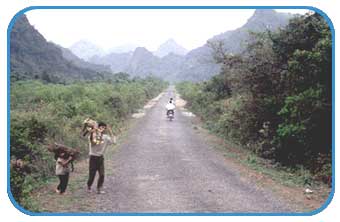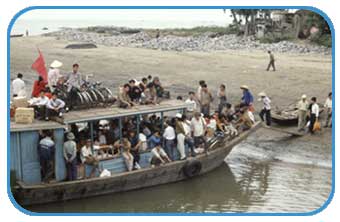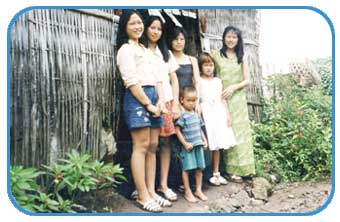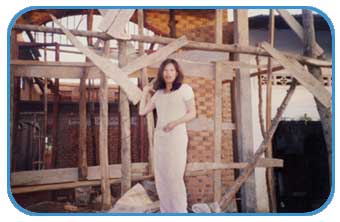

� Simon Scoones/Worldaware
|
The
countryside in northern Vietnam. |
Anh and
Kim are two sisters who were born in Haiphong
in northern Vietnam. When fighting broke out in
the country, they had to flee with their family
by boat to China. At the time, Kim was 4 years
old, and Anh was only 3. But Anh can still remember
her last sight of her village:
"I
saw hundreds of people trying to escape the
thick black smoke rising up into the grey sky.
All our homes, the entire village was in flames.
People had grabbed what belongings they could
carry before they left. Some had bicycles to
carry their possessions, others had baskets
or pushed carts. Little children were carried
by older brothers and sisters or pulled along
by harassed mothers, arms full of bundles".
They fled
to the coast where they got into boats to escape
to China. Kim remembers the journey:
"When
we got into the boat, I liked watching fish
swimming in the water, and all the boats around
us. It was like an adventure for me. I did not
understand what was really happening. My mum
was holding my little sister and she was crying,
but I didn't understand, I was too excited."
They landed
on Hainan Island, part of China and were put into
a refugee camp with hundreds of other 'boat people'.
To earn their keep, the adults were forced to
clear areas of jungle to create land for farming.
The conditions in the camp were very bad, and
it was not long before Anh and Kim's family decided
to escape into the jungle along with other refugee
families. They were lucky to have a bicycle to
help them carry their things. The camp's guards
chased them, but later the guards returned to
the camp empty-handed, sure that the escaped refugees
would not survive.
But the refugees
did survive, helped by some of the local people.
But after two years, Kim and Anh's parents decided
it was time to send the two girls away. They wanted
them to have a chance of a better life. Kim and
Anh's Mum and Dad worked hard to save up enough
money to pay for their boat fares. They had to
trust the boat owners and hoped that Anh, now
5, and Kim, 6, would reach a safe destination.

� Simon Scoones/Worldaware |
"We
were told that we were going on a boat trip
with a relative," remembers Anh, " and so
we waved goodbye to our parents, not knowing
that it would be many years before we saw
them again." |
The journey
would be dangerous. The tiny fishing boat was
packed with escaping refugees and took many weeks
to reach land. The girls were lost, tired, hungry
and scared. Kim says:
"After
four days our food and water ran out. The boat
owners were more concerned to get money by packing
in as many people as possible, rather than taking
up room with food. The ocean was huge, beating
our little boat with big, lashing waves. We
were burnt by the sun, and drenched by the rain.
But at least, when it rained, we had some water
to drink. Drinking seawater was like poison,
and everyone on our boat was sick. I lost count
of the days; each day was just the same as the
last. But then, one day, a big ship came and
picked us up. We had been on the sea for three
weeks."
Many other
boat people were not as lucky as Anh and Kim.
Some were in boats that were deliberately sunk.
Pirates boarded other boats, and the people were
attacked and often killed. Others starved to death
or died of thirst. But the Danish ship that had
rescued Anh and Kim took them to Hong Kong where
they were put in another refugee camp. Anh says:
"At
first we thought it was fun. We had food and
were safe in a new country. With so many refugees,
conditions were poor, but we were too grateful
just being alive to notice this. All the children
were put in huts together - there were about
200 in my hut. We slept on bunk beds on three
levels. I didn't realise it at the time, but
the beds were damp. We were always hungry and
so we ate whatever we were given. We all ate
in the big hall - it was always very noisy.
We had no shoes or underwear - there was none
available. We were supposed to have school every
weekday for two hours, but most of us hid instead."
After five
years in the refugee camp, Anh was now 10 and
Kim was 11. Being older, they became more aware
of the poor conditions in the camp. Anh remembers
feeling very angry:
"I became
aware of the high fences, the guards and the
barbed wire. Why were we locked up when we were
not criminals? I felt unwanted, the guards seemed
to hate us, and they had whiter skin than ours.
Like many others, I became very bored - the
same tangled wires, the same blue uniforms.
And bored people would argue over silly little
things, which would lead to fighting."
Over those
five long years, the girls had no news at all
about their parents. Several charities tried to
trace them but they had no success. By now, the
two sisters had spent almost all their lives fleeing
from danger. Then they were told that they were
going to be moved to London, England to live with
other refugee children. Anh and Kim had a new
adventure, flying to a new country. At first this
was almost as scary as when they had left on the
boat. Anh remembers:
When they
first arrived in London it was spring, but the
children felt very cold. Everything looked so
big - but most importantly, it smelt free. Everything
was strange and new at first. Along with the other
refugee children, they had to learn about a new
language, a new country, a new school, a new life.
But Anh and Kim quickly learned how to speak and
write English. Sadly, they had to cope with being
bullied.
When Anh
was 16 and Kim was 17, the sisters returned to
China for a visit to be re-united with the rest
of their family. They hadn't seen their parents
for 11 years. Anh and Kim also discovered that
they had a grandmother still living in Vietnam.
Three years later, their parents, and younger
sister and brother came to live with the girls
in England.
Finally,
in 1999, Kim and Anh travelled to Vietnam to visit
their grandmother, more than twenty years after
they had fled to escape the fighting there. The
two sisters were now grown adults � Anh was 24
years old and Kim was 25. As visitors, they no
longer felt that they belonged here, and found
it difficult to cope with the poor conditions
in their grandmother's village. They also found
out that their grandfather and other members of
their family had been killed during the years
of fighting.
After all
those years away from Vietnam, Anh and Kim have
grown used to running water, indoor toilets and
easy communications. But they did enjoy meeting
up with cousins and other relatives. By chatting
to them, Anh and Kim could learn a bit more about
their old homeland, and what life might have been
like for them if they had never become refugees.
 |
Here
is a picture from that time. Anh is wearing
a black top in the centre, and Kim is wearing
a green dress on the right. They are standing
outside their grandmother's house with four
of their cousins. |
Now that
Anh and Kim have good jobs in England, they want
to try and make their grandmother's life as happy
and comfortable as they can. They have been saving
up to build her a brick house. In November 2000,
they went back to see it being built. As Anh said:
 |
"Grandmother's
new brick house, which is being built to replace
her bamboo hut. This is so that she does not
have to take shelter in the hurricane season
or the monsoon season." |
Although
they are now more settled, life is still not easy
for the sisters. Their father is not well and
both parents have found the move to England very
difficult. But Anh and Kim know how fortunate
they have been to find their parents again, to
receive a good education and to be able to begin
a new life. At least for this one refugee family
there has been a fairly happy ending!
|
